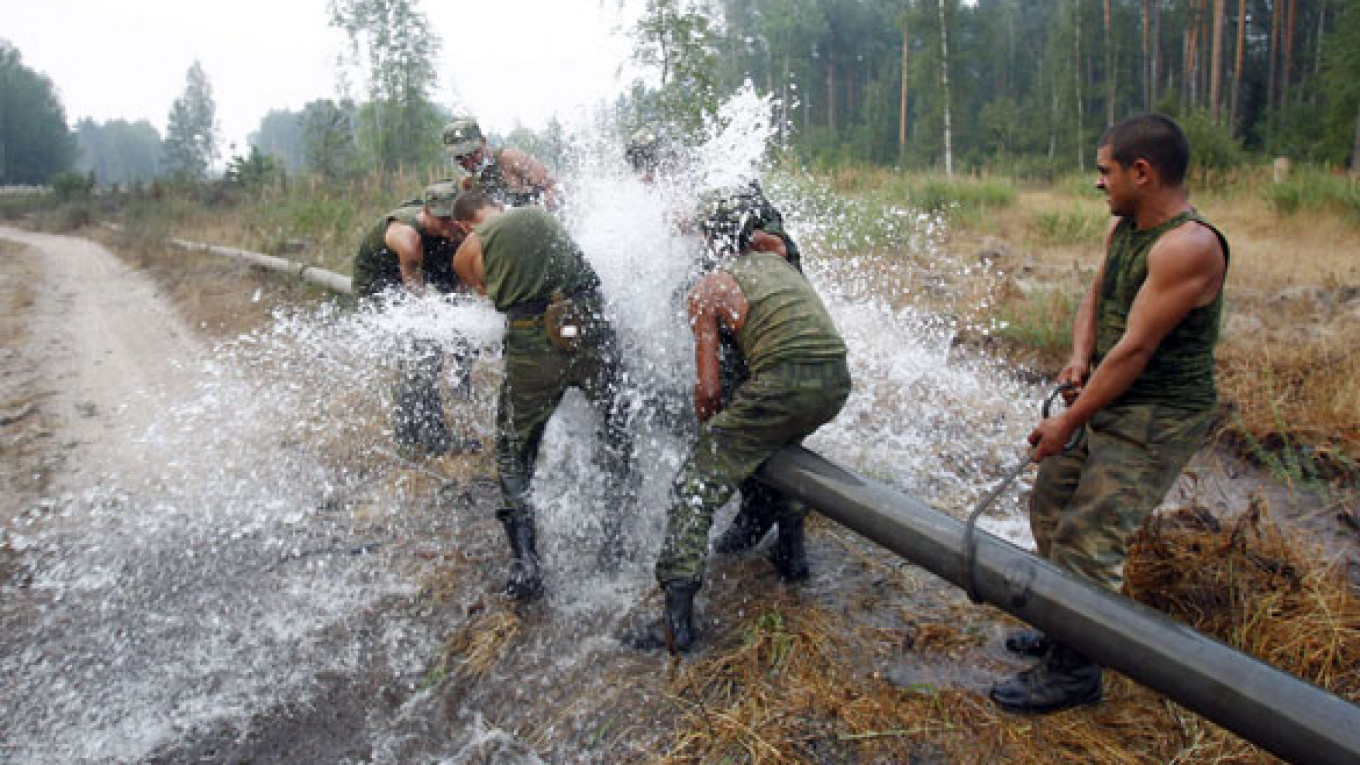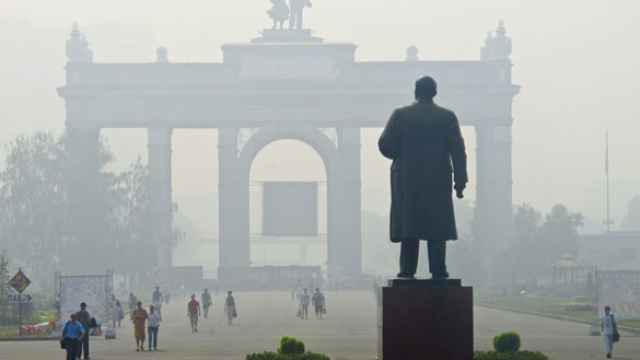The devastating wildfires have shown severe shortcomings in Russia's firefighting organization, deficits that are all the more bizarre because until recently the country possessed one of the world's biggest task forces specialized in combating burning woods and fields.
That organization, the Aerial Forest Protection Center, or Avialesokhrana, employed some 9,000 firefighters specially trained and equipped to put out wildfires in Soviet times.
Most of them were so-called smokejumpers, who fly and parachute right into remote fire-hit areas.
In the 1990s, their number was slashed to about 4,000, and in 2007, the center was reduced to the status of a monitoring agency, with just 1,800 personnel left at its disposal.
This summer's catastrophic fires have shown that the reform was a failure and the best way out is to re-establish a unified wildfire fighting center, Andrei Yeritsov, deputy director of the Aerial Forest Protection Center, said Wednesday.
"It would be good if the responsibility for putting out fires were handed back to the federal level," Yeritsov told The Moscow Times.
The reform was part of the new Forest Code, which came into effect on Jan. 1, 2007.
The code, which has been lambasted by environmentalists as the result of timber and real estate industry lobbying, transferred responsibility for the country's vast woodlands to local owners and regional authorities, effectively crippling the woodland fire control system.
The case of the Aerial Forest Protection Center highlights environmentalists' argument.
With the reform, most of the center's resources went into the hands of the country's regions, which seriously impeded effective firefighting activities, Yeritsov said.
Much of the center's staff and equipment ended up in the regions where they happened to be based, leading to massive misallocations, he said.
As an example, he named the center's once formidable fleet of firefighting planes and helicopters. All 106 aircraft, mainly consisting of An-2 biplanes, were given to the regions, where just half of them are now being used for firefighting.
The Vladimir region, east of Moscow, got 16 planes, although it needed only one, meaning that the aircraft sit mostly on the ground or are used for other, commercial purposes.
"This is absurd," Yeritsov said.
The regions also laid off many of the firefighters they inherited, leading to the current shortage of wildfire specialists, he said.
"These people have enormous experience in putting out wildfires — they did it every year. Normal fire brigades do this maybe once in a decade," he said.
Officials with the Aerial Forest Protection Center have asked the government to consider re-establishing the center's position as the central institution for fighting wildfires and hope that they will be successful, Yeritsov said.
"We know our suggestions are being considered. It would be good to return to the old system," he said.
Prime Minister Vladimir Putin, who signed the Forest Code as president in 2006, said Tuesday that the Federal Forest Agency, which oversees the Aerial Forest Protection Center, should be placed under direct government control. The agency now answers to the Agriculture Ministry.
Oleg Aksyonov, a spokesman for the ministry, said he could not comment on further reforms because they would be taken directly by the government.
Putin's spokesman Dmitry Peskov did not answer repeated calls to his cell phone Wednesday.
The situation is unlikely to improve soon because regional governors will be reluctant to hand back their powers to the Aerial Forest Protection Center, said Johann Goldammer, head of the Global Fire Monitoring Center at the University of Freiburg in Germany.
In a telephone interview, Goldammer assailed the Forest Code for transferring responsibility from the state to commercial owners.
"These owners are more interested in quick profits than in sustainable forestry," he said.
State control should be reinstated because the country's vast forests and carbon-producing marshes are hugely important for the global ecosystem, he said.
But Russia is not alone when it comes to disorganized firefighting capabilities. The most widespread problem is that traditional firefighters are not trained and equipped for wildfires, Goldammer said.
In that respect, the Aerial Forest Protection Center had been a model agency. "In good times they had very good equipment and trained specialists," he said.
Decentralization often makes things more complicated, yet some European regions have successfully built efficient structures.
"Catalonia in Spain and regions in the south of France probably have Europe's best capacities to fight wildfires," Goldammer said.
Others, notably Greece, have failed by introducing reforms aiming at shifting powers from forest authorities to firefighters.
Europeans and Russians could also learn from the United States, where state-level organization is backed up with national coordination.
A specialist team from the U.S. Forest Disaster Assistance Support Program is currently in Moscow to assess how Washington can help fighting the wildfires, State Department spokesman Philip Crowley told reporters in Washington on Tuesday.
"They’re working — continuing to consult with the Russian government about how we can be helpful," he said, according to a transcript on the State Department's web site.
The meetings come after Secretary of State Hillary Clinton last week offered help to Foreign Minister Sergei Lavrov.
Both countries have a history of cooperation in fighting fires. In the 1970s, they began an exchange of smokejumpers, according to the U.S. government's web site.
In 2008, representatives of the Aerial Forest Protection Center held an exchange of ideas with American wildfire managers in California, and U.S. Forest Service specialists participated in a June conference on cross-border forest fires in the East Siberian city of Irkutsk.
A Message from The Moscow Times:
Dear readers,
We are facing unprecedented challenges. Russia's Prosecutor General's Office has designated The Moscow Times as an "undesirable" organization, criminalizing our work and putting our staff at risk of prosecution. This follows our earlier unjust labeling as a "foreign agent."
These actions are direct attempts to silence independent journalism in Russia. The authorities claim our work "discredits the decisions of the Russian leadership." We see things differently: we strive to provide accurate, unbiased reporting on Russia.
We, the journalists of The Moscow Times, refuse to be silenced. But to continue our work, we need your help.
Your support, no matter how small, makes a world of difference. If you can, please support us monthly starting from just $2. It's quick to set up, and every contribution makes a significant impact.
By supporting The Moscow Times, you're defending open, independent journalism in the face of repression. Thank you for standing with us.
Remind me later.







